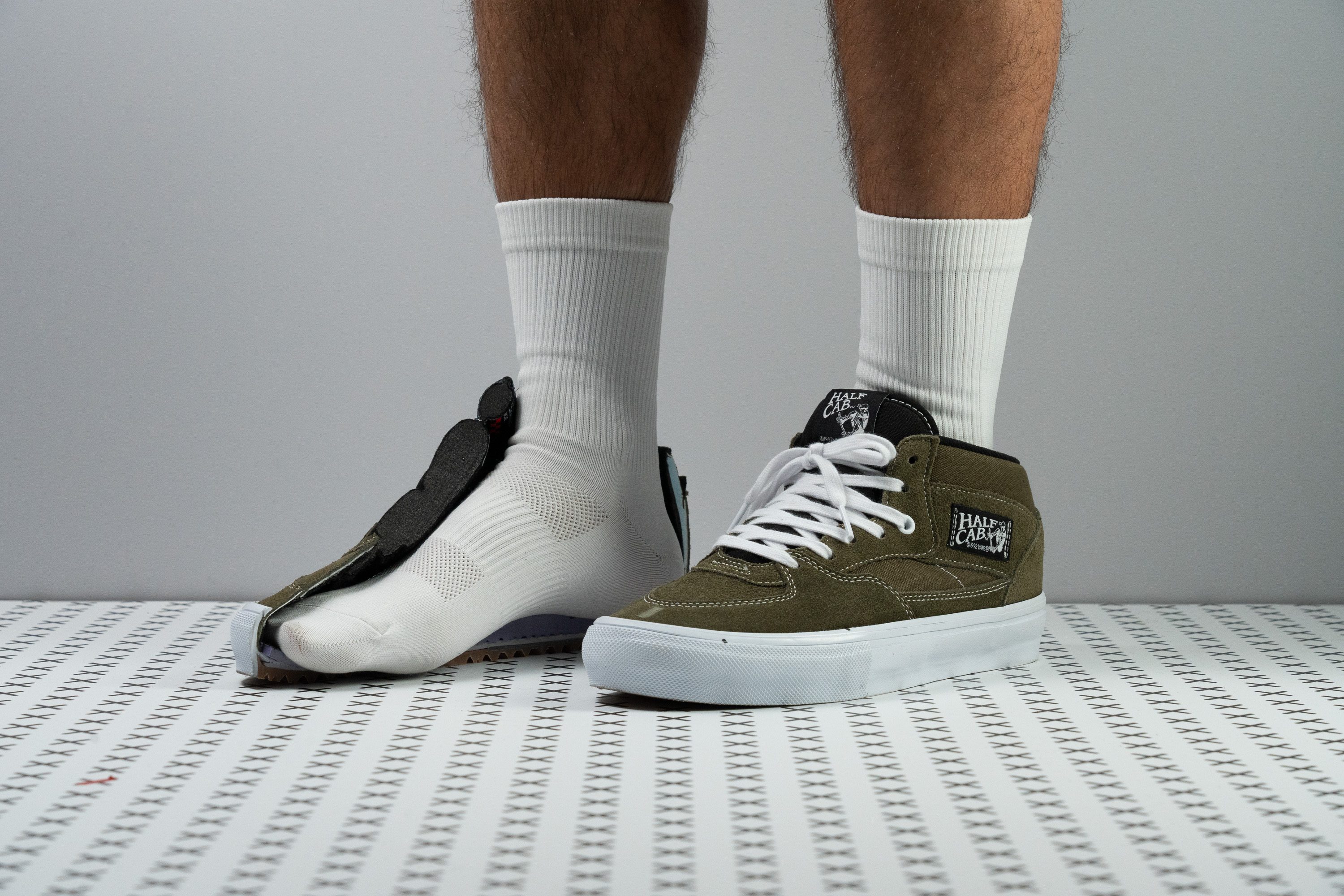Our verdict
- Top pick in best skate shoes (2024)
Pros
- Great board feel
- Thickly padded tongue
- Super grippy
- Spacious toe box
- Versatile style
- Tank-like durability
- Interchangeable insole
- Affordable
Cons
- Really heavy
- Issues with stability
Audience verdict
Comparison
The most similar trainers compared
+ + Add a shoe | |||||
|---|---|---|---|---|---|
| Audience score | 86 Decent! | 93 Great! | 89 Good! | 92 Great! | |
| Price | £105 | £130 | £100 | £180 | |
| Style | RetroSporty | ClassicRetroSporty | ClassicSportyMinimalist | RetroSporty | |
| Shock absorption | - | - | - | Moderate | |
| Energy return | - | - | - | High | |
| Traction | - | - | - | High | |
| Breathability | Moderate | Warm | Warm | Warm | |
| Weight lab | 17.4 oz / 493g | 15.1 oz / 427g | 14.7 oz / 418g | 16.3 oz / 462g | |
| Size | True to size | True to size | True to size | True to size | |
| Midsole softness | Soft | Soft | - | Firm | |
| Material | SuedeVulc Sole | Cup SoleLeather | CanvasLeatherSuede | LeatherSuedeTextile | |
| Season | SpringFall | Winter | Winter | SpringFall | |
| Inspired from | Skate | Basketball | Basketball | Basketball | |
| Width / fit | Wide | Medium | Narrow | Medium | |
| Toebox width | Medium | Medium | Narrow | Medium | |
| Leather/suede quality | Real suede | Real leather | Real leather | Real suede | |
| Toebox durability | Good | Decent | Good | Good | |
| Heel padding durability | Decent | Decent | Bad | Decent | |
| Outsole durability | Decent | Good | Decent | Good | |
| Heel stack lab | 21.8 mm | 22.2 mm | 17.5 mm | 25.5 mm | |
| Stiffness | Stiff | Stiff | Moderate | Stiff | |
| Tongue padding | Average | Average | Average | Average | |
| Drop lab | 8.1 mm | 11.0 mm | 6.0 mm | 8.5 mm | |
| Forefoot | 13.7 mm | 11.2 mm | 11.5 mm | 17.0 mm | |
| Removable insole | ✓ | ✓ | ✓ | ✓ | |
| Heel tab | None | None | None | Finger loop | |
| Torsional rigidity | Flexible | Moderate | Flexible | Stiff | |
| Heel counter stiffness | Moderate | Stiff | Flexible | Moderate | |
| Closure | Laces | Laces | Laces | LacesVelcro | |
| Top | Mid top | Mid top | Mid top | Mid top | |
| Ranking | #110 Bottom 9% | #28 Top 24% | #80 Bottom 33% | #36 Top 30% | |
| Popularity | #51 Top 43% | #52 Top 43% | #50 Top 42% | #27 Top 23% |
Who should buy
After seeing the results of our lab assessments and wear tests, we now believe that the Vans Half Cab is a good match for the following:
- wearers who want shoes with prominently thick tongues
- sneakerheads who are OK with suede, leather, and other animal derivatives
- skating enthusiasts who want flat and stable shoes
- buyers who want kicks that are big on durability
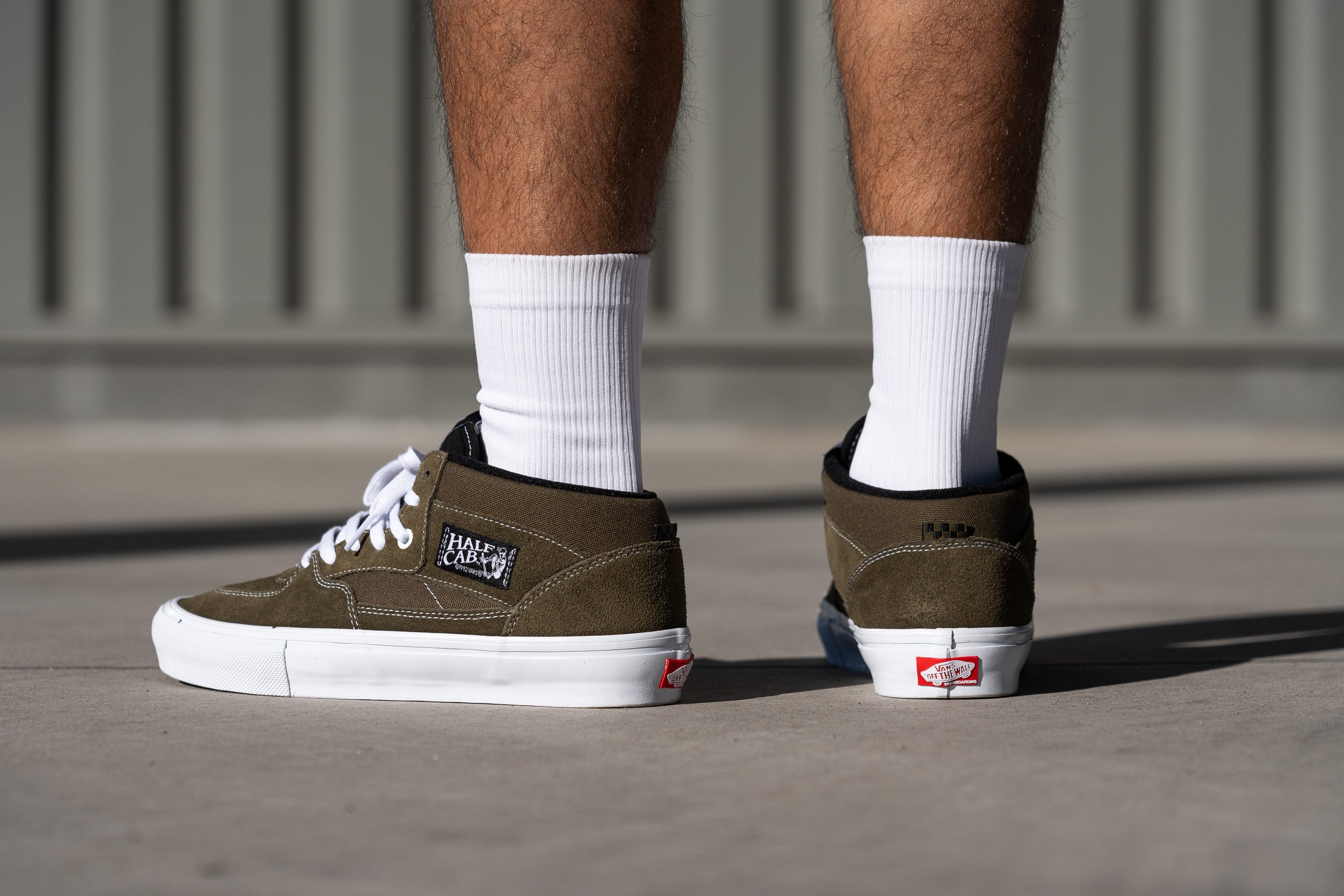
Who should NOT buy
The heaviness that we felt while wearing the Vans Half Cab was so real. Even the slightly heavy Adidas Campus 00S feels lighter. The Vans Slip-On is also a good alternative.
Based on our experience, the shoe's stability was a source of major concern. The sidewalls weren't so stiff, the torsional rigidity was low, and the platform was narrower than usual. The Vans Old Skool offers much better stability.
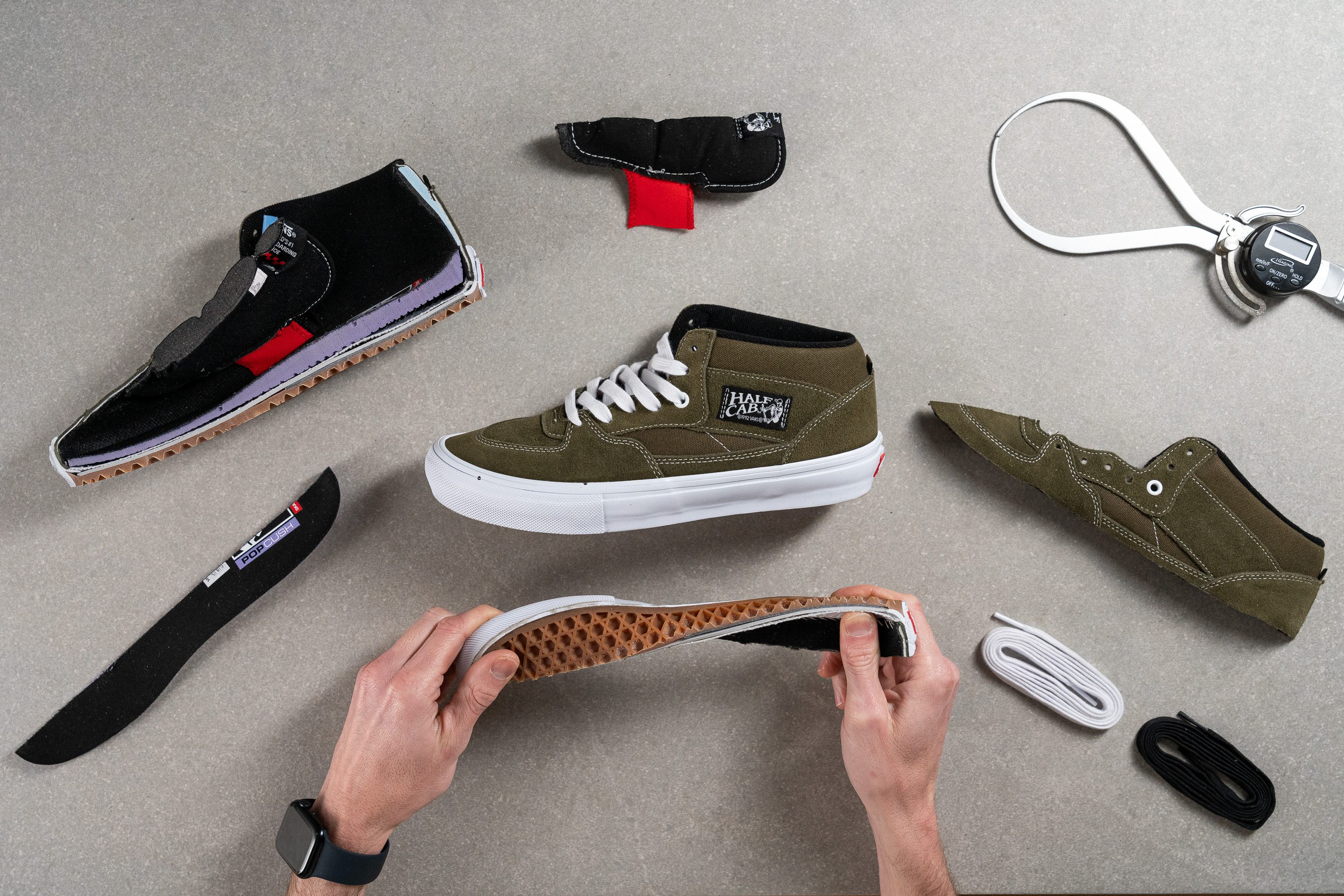
Cushioning
Heel stack
Given its weight, we were surprised to see that the Half Cab had way thinner midsoles. At the heel, it was only 21.8 mm thick based on our calliper readings. This number is way less than average; there's a 30% reduction!
Now, how did it feel on the feet? Fortunately, it was not at all disappointing. The lower profile afforded by the thin midsole gave us more control over our steps, which was helpful considering that the shoe was heavy.
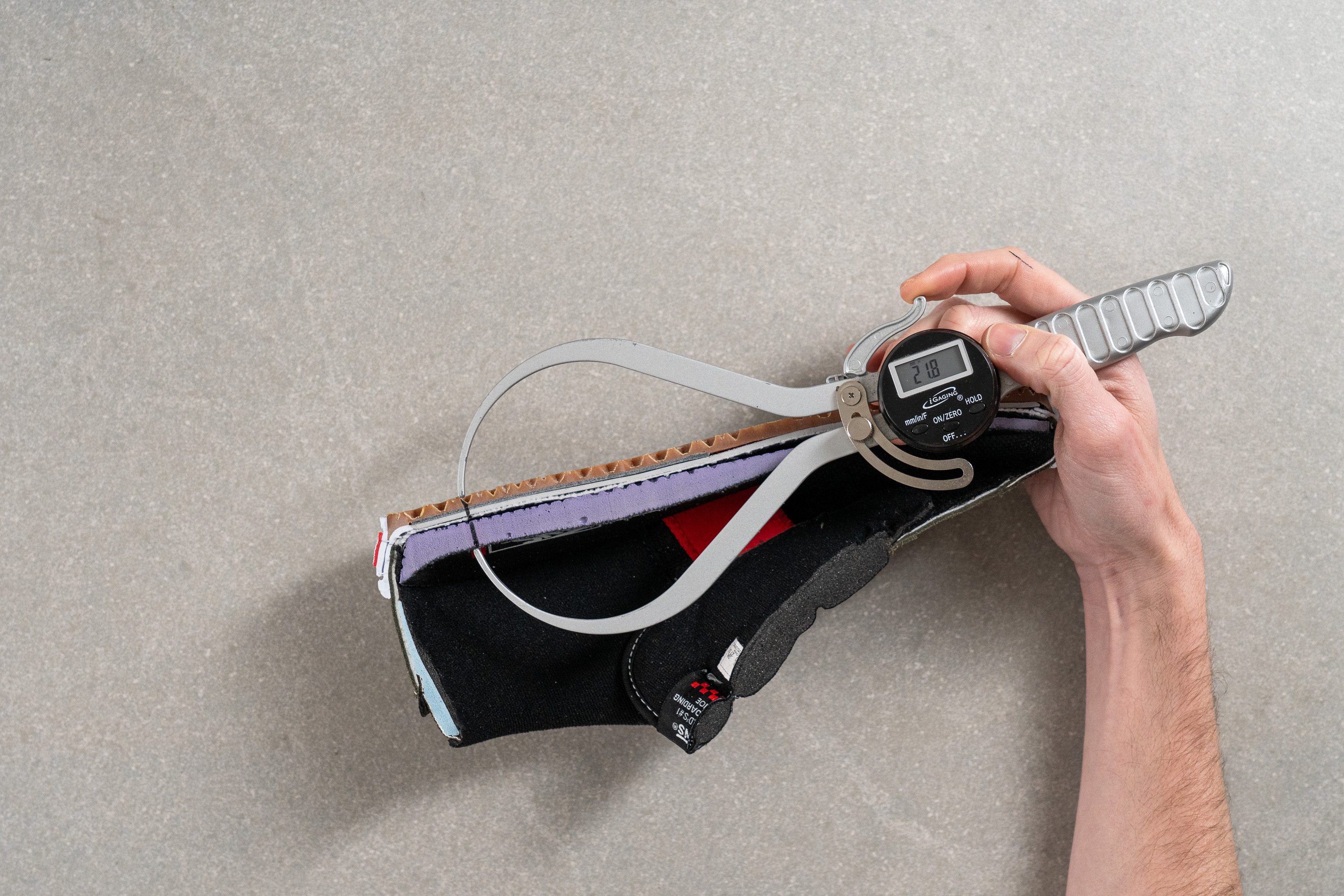
| Half Cab | 21.8 mm |
| Average | 30.7 mm |
Forefoot stack
The forefoot is thinner than average at 13.7 mm. We loved how it brought us closer to the ground, allowing us to feel quicker on our feet.
Still, we think that people who love cushioning would find the Vans Half Cab lacking. They might be happier with the Adidas Alphaboost V1, especially since this shoe is already on sale these days.
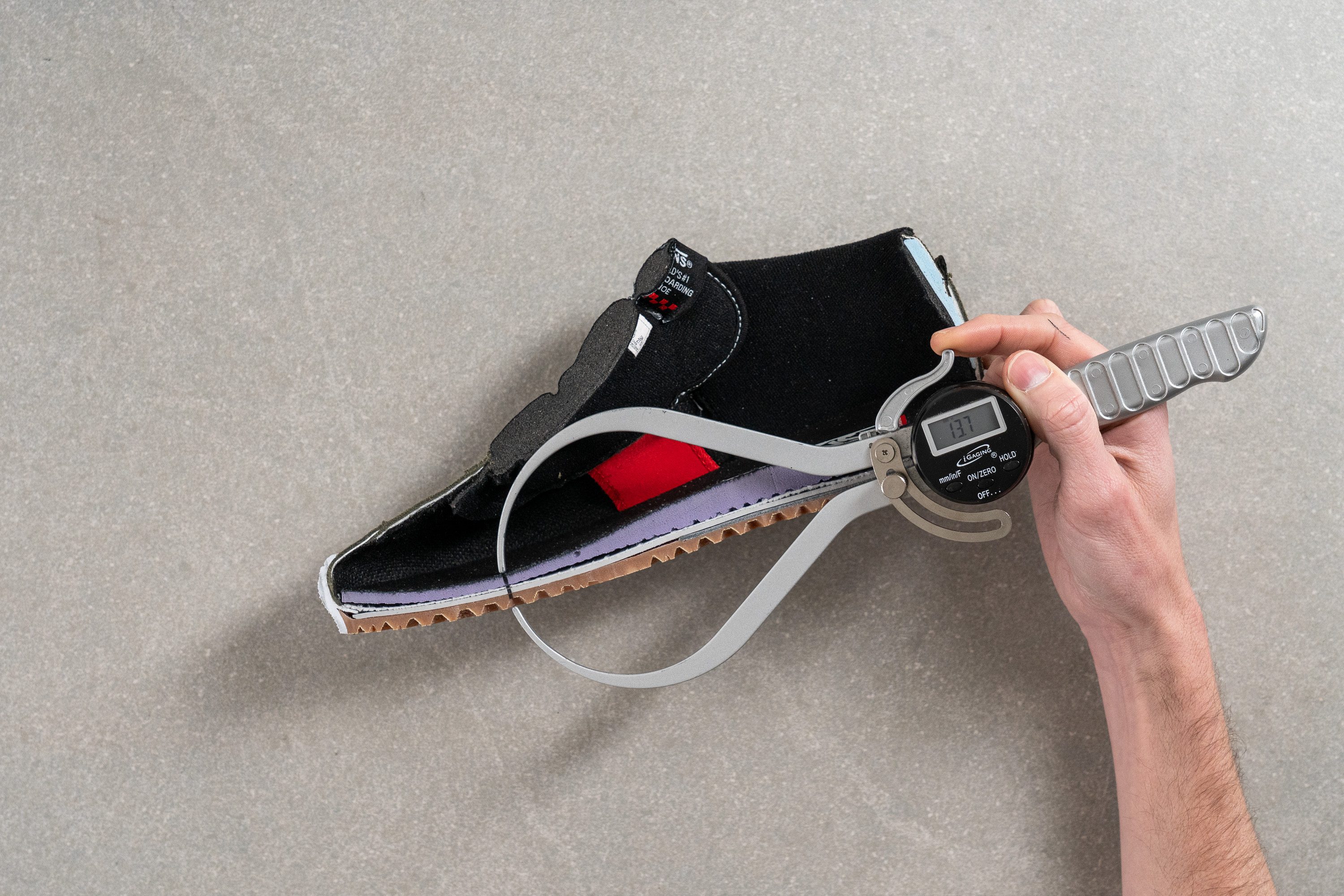
| Half Cab | 13.7 mm |
| Average | 19.5 mm |
Drop
The Vans Half Cab feels flatter than usual with a heel-to-toe drop of 8.1 mm. Not everyone loves the heel elevation, so this sneaker was a very welcome alternative.
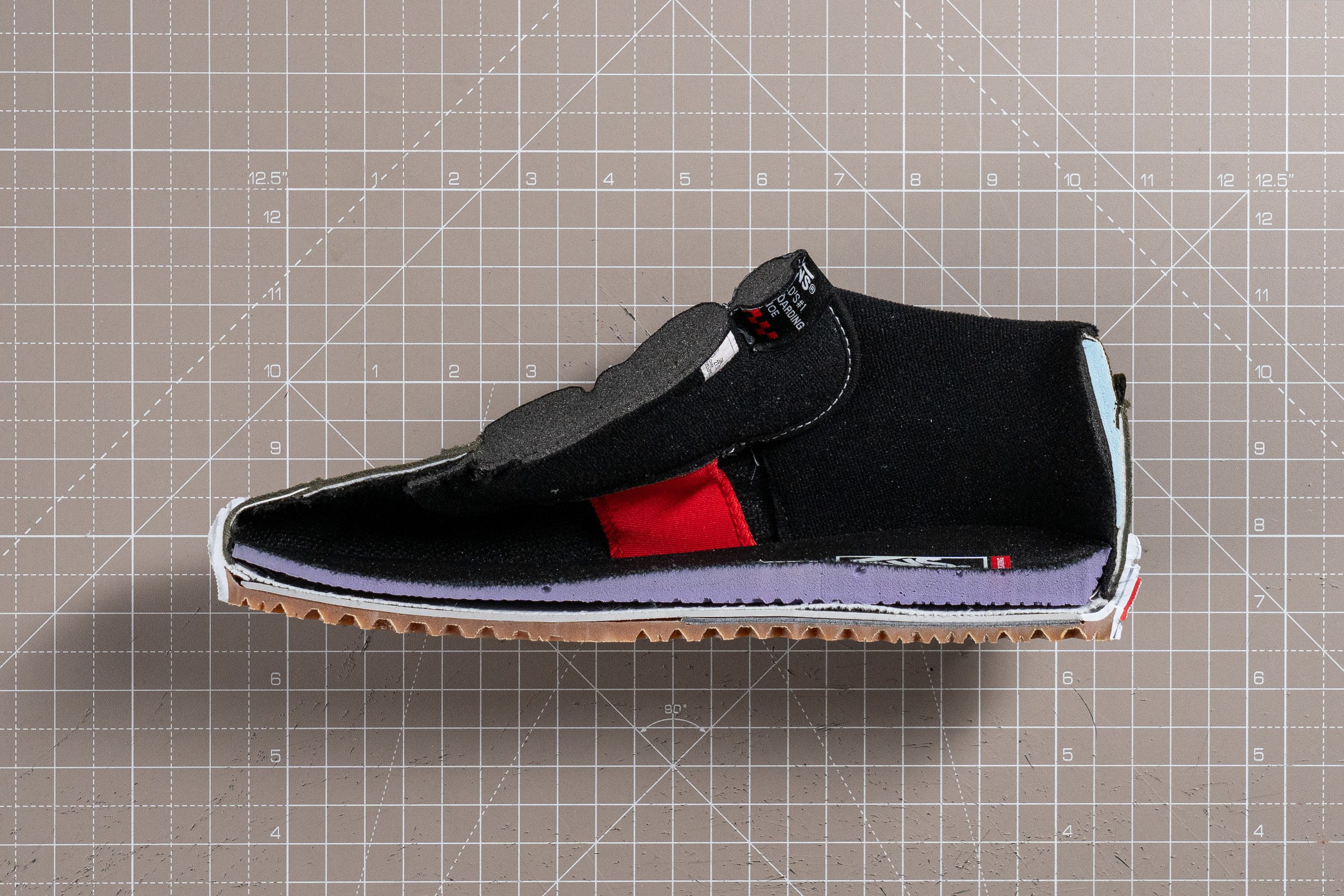
| Half Cab | 8.1 mm |
| Average | 11.2 mm |
Midsole softness
Even though the vulcanised sole and rubber outsole add a lot of firmness to the Half Cab, there is still room for comfort in this skate sneaker.
An ultra-thick insole plays a key role in this Vans shoe's underfoot experience. We found it to be amazingly plush at 15.0 HA which is a whopping 100% softer than the average sneaker midsole!
It made long periods of wearing the sneaker much more pleasant.
| Half Cab | 15.0 HA |
| Average | 28.6 HA |
Size and fit
Size
Vans Half Cab fits true to size (14 votes).
Internal length
The internal length of the Vans Half Cab is about the same as average at 272.7 mm.
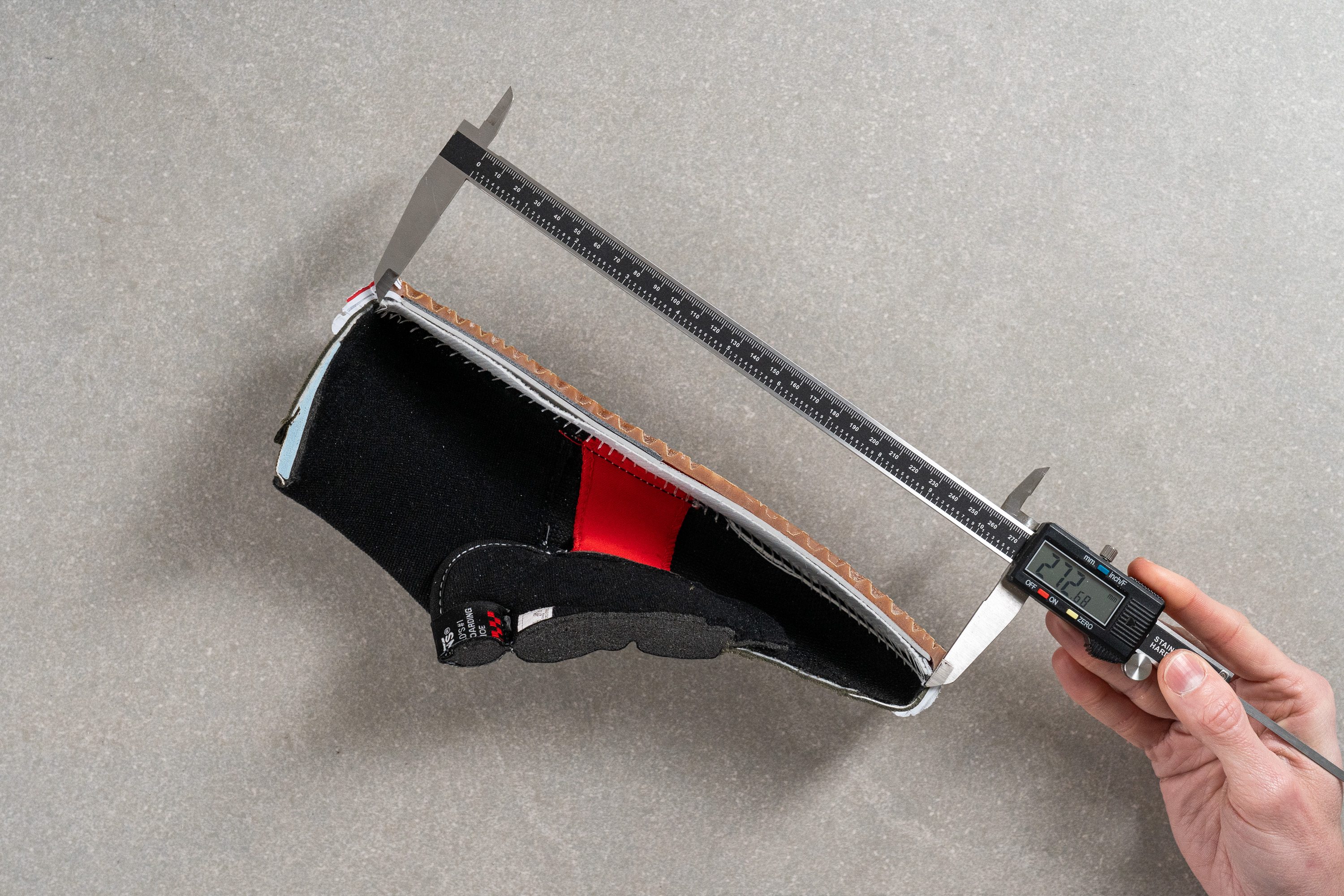
| Half Cab | 272.7 mm |
| Average | 272.3 mm |
Width / Fit
Despite the Half Cab's notably narrow platform (more on that below), the shoe's interiors impressed us with the amount of space!
Measuring the widest part with a calliper, we got a very high reading of 96.8 mm. It is indeed notably wider than average.
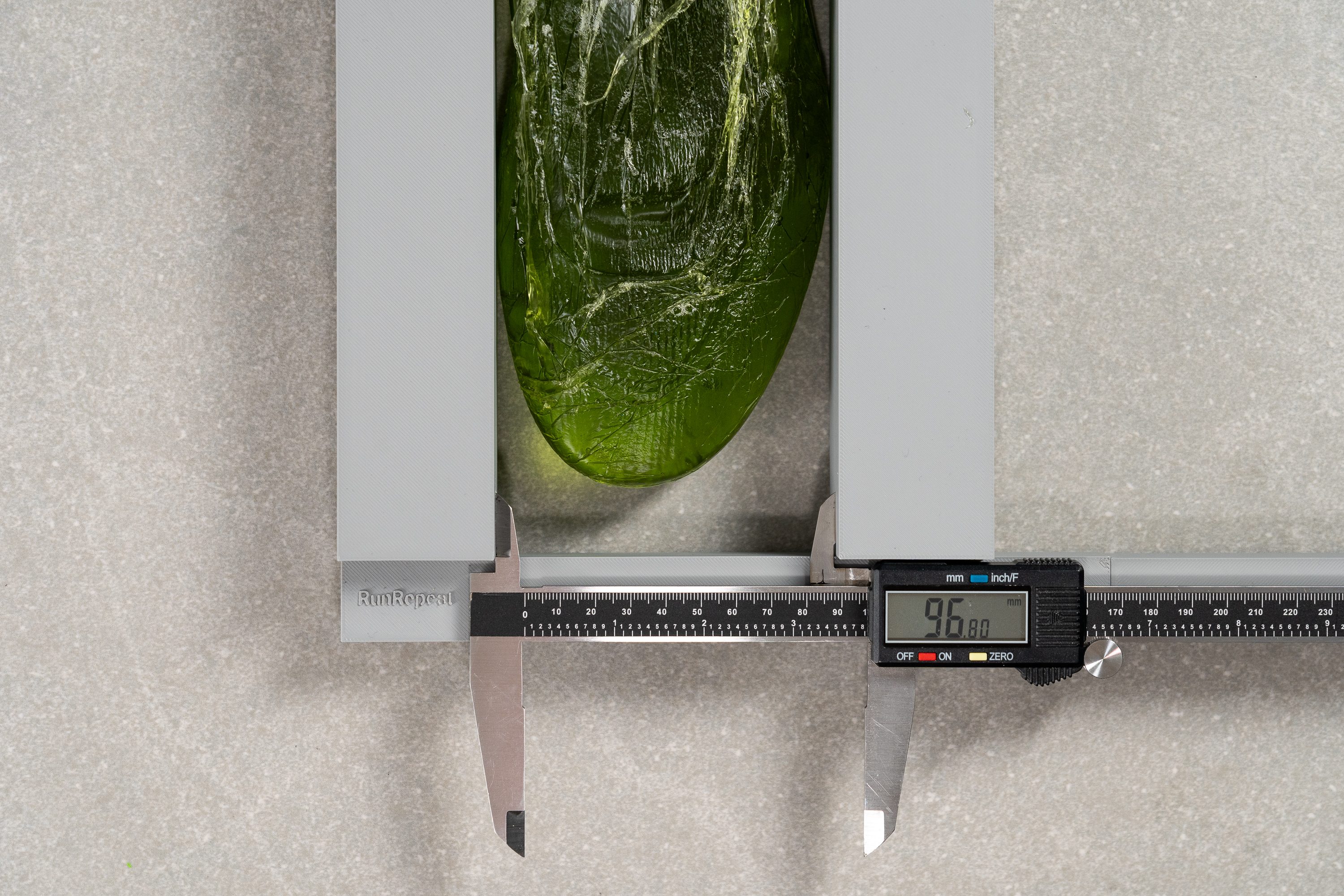
| Half Cab | 96.8 mm |
| Average | 92.5 mm |
Toebox width
There is no sharp toebox tapering to mess with the shoe's fit either. We got another above-average width of 69.8 mm near the big toe.
Plenty of wiggle room to feel comfortable and stable on both the pavement and the skateboard.
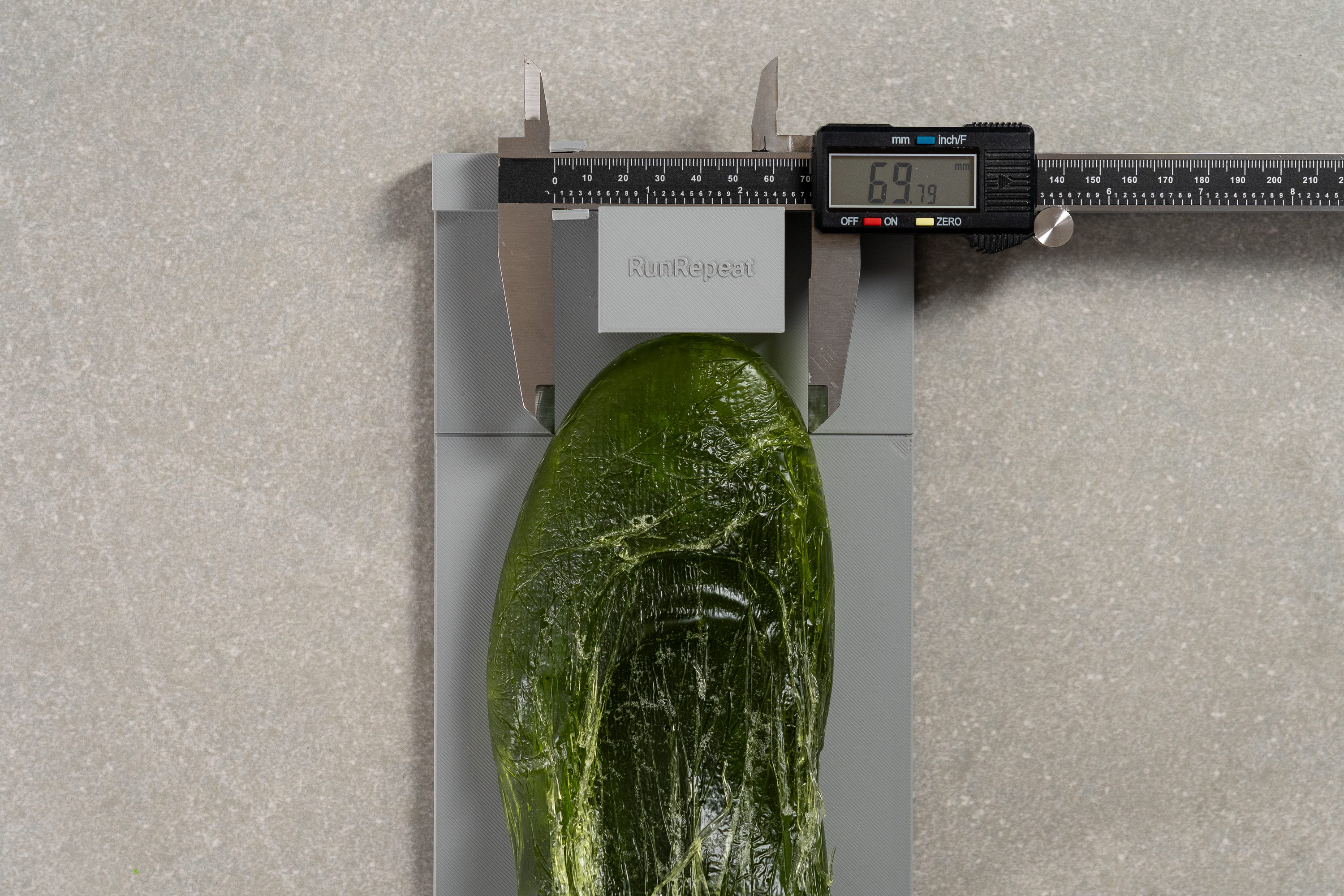
| Half Cab | 69.8 mm |
| Average | 68.9 mm |
Toebox height
However, you might feel limited by the shoe's shallow vertical space of only 23.0 mm. This is the flip side of the vulc sole.
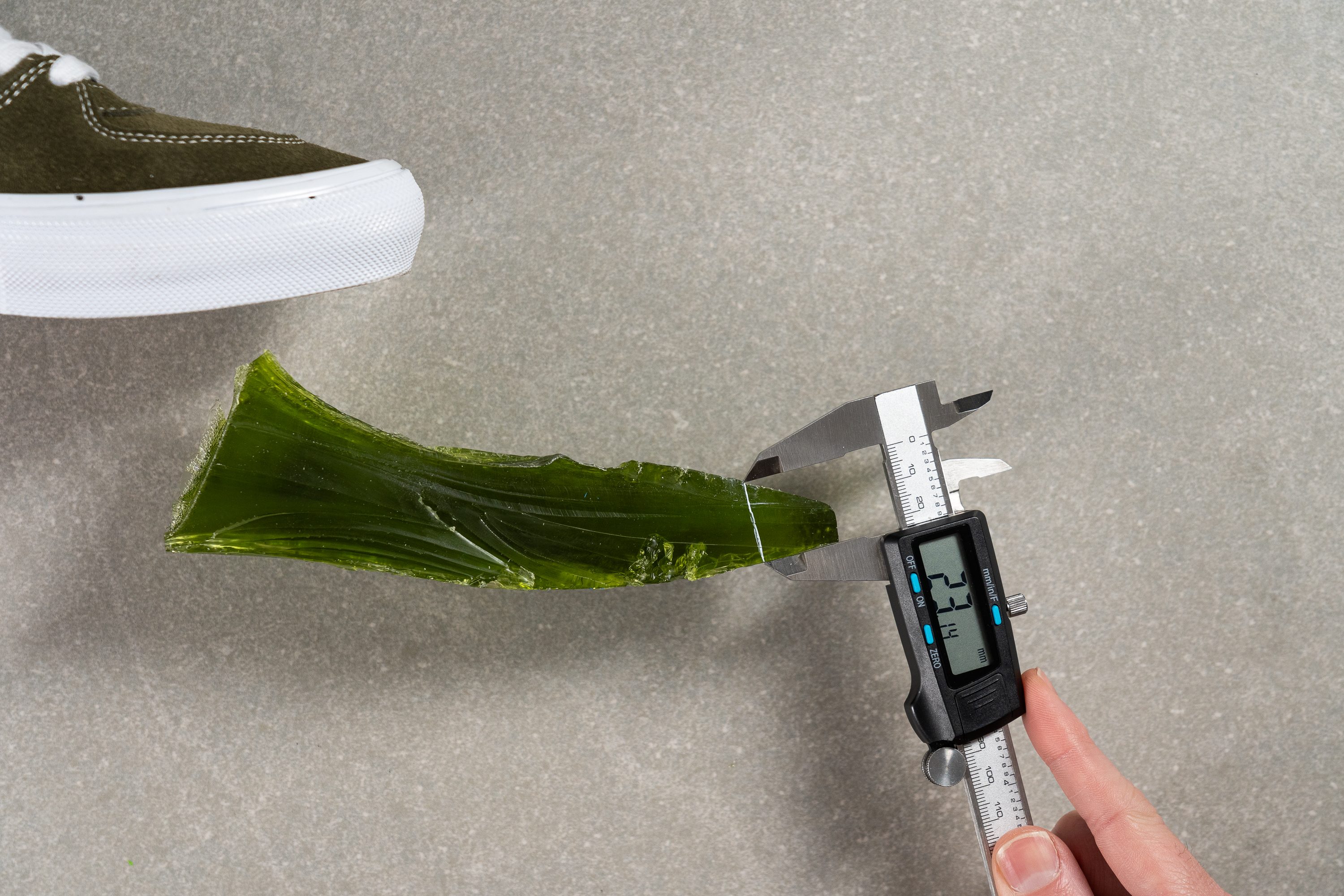
| Half Cab | 23.0 mm |
| Average | 27.8 mm |
Flexibility / Stiffness
Despite its low twist resistance, the Vans Half Cab still had the typical amount of flexibility overall. After performing our standard flexibility test on it, we learned that it needed 22.6N of force to bend at 90 degrees. This number is almost equal to the amount of force the average sneaker would need.
This test follows an older methodology, which is why you don't see recently tested shoes in the chart. Results from different methodologies can not be compared.
| Half Cab | 22.6N |
| Average | 23.3N |
Weight
The weight is indeed a waterloo for this shoe. It surely felt so heavy at 17.4 ounces or 493 grammes. We had to be engrossed in whatever it was that we were doing so that we wouldn't feel the Half Cab's weight on our feet.
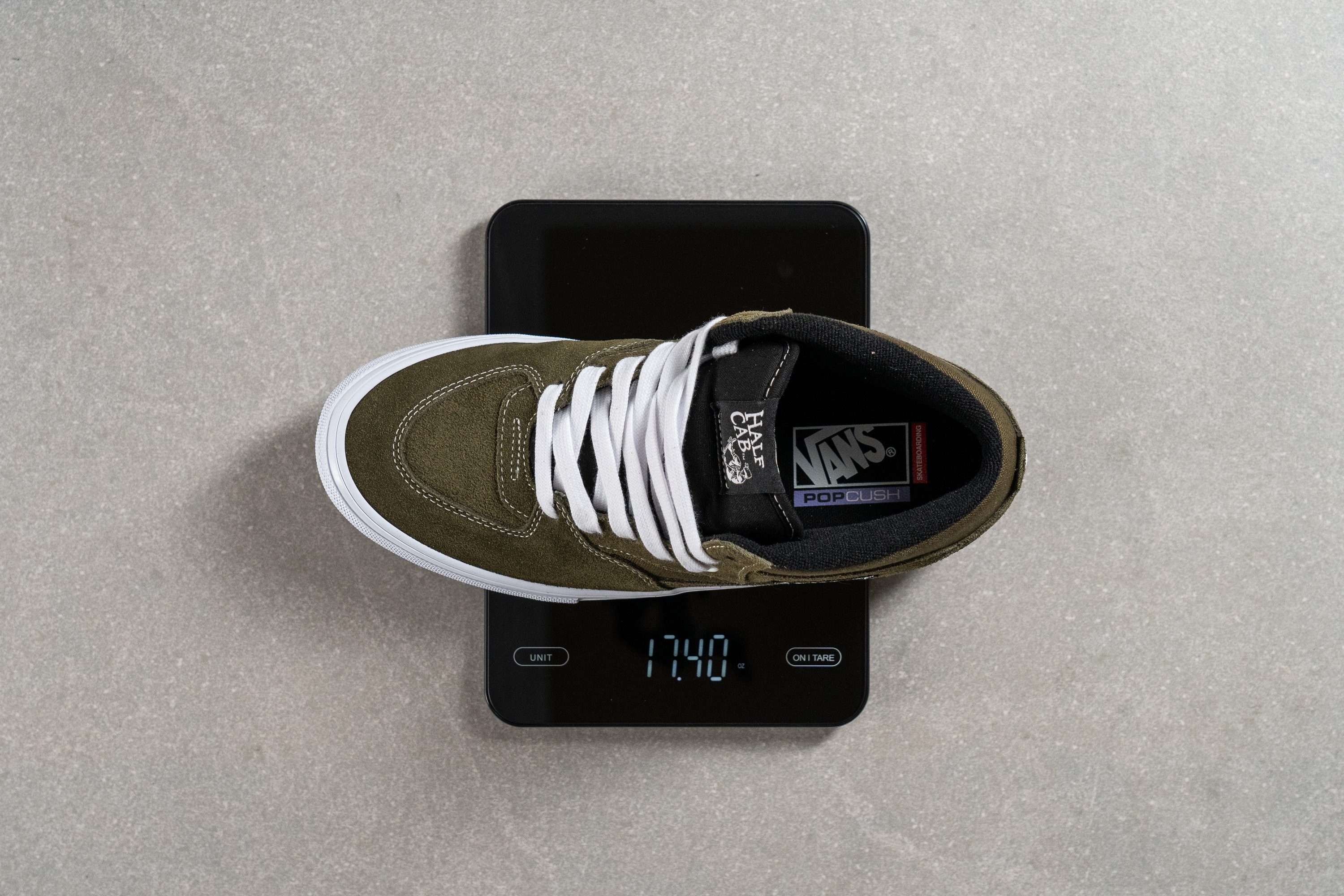
| Half Cab | 17.4 oz (493g) |
| Average | 13.8 oz (390g) |
Breathability
Breathability was not an issue for us. The shoe was able to deliver as much ventilation as the other trainers that we tried. This is quite a feat considering that the Vans Half Cab is made of poreless materials throughout.
The New Balance 57/40 got a 4 out of 5 in our breathability test and as seen in the video above, the Half Cab from Vans performs quite similarly. The only difference is that much of the smoke could only escape through the tongue. The 3 out of 5 that this sneaker got from us is quite warranted.
The light test that we did is captured in the video above. This test confirmed that the material that composed the upper did not have pores for smoke or even light to pass through.

We examined the upper material, which we verified as suede in another test, and it just showed as one solid block under the microscope. Without the tongue and its non-gusseted design, it would have been difficult to get any air.
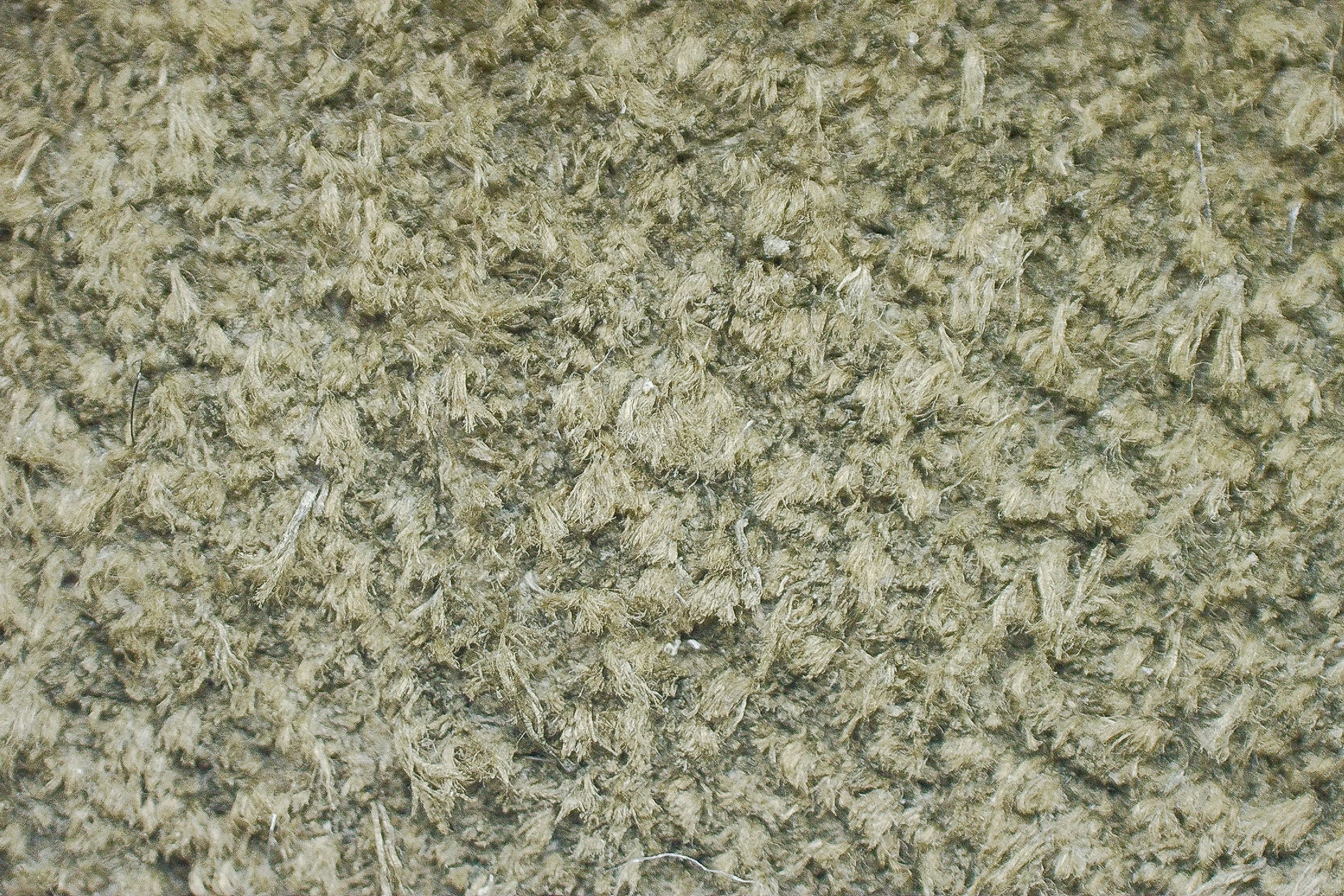
| Half Cab | 3 |
| Average | 3 |
Stability
Lateral stability test
The medial sidewalls were a bit of a challenge when we were wear-testing the Half Cab. Being made of suede, they were indeed on the softer side. The softness surely had its (negative) effects on the shoe's overall stability.
Torsional rigidity
Given its vulcanised sole design, it's a surprise that the Vans Half Cab isn't so resistant to twisting. We did not even have to exert so much effort when we tried to manually twist this shoe in the lab.
It only got a 2 out of 5 from us for torsional rigidity.
Make no mistake, though! This flexibility also had its advantages, especially when we had to move or pose at peculiar angles.
| Half Cab | 2 |
| Average | 3.6 |
Heel counter stiffness
The heel counter gave a moderate amount of security to the forefoot. We would describe its grasp as just right. The 3 out of 5 that it got is pretty much commensurate to its performance.
| Half Cab | 3 |
| Average | 3.2 |
Midsole width - forefoot
The platform felt slightly narrower than usual. When we measured it using a calliper, the forefoot registered only 100.4 mm, a number which is less than the average.
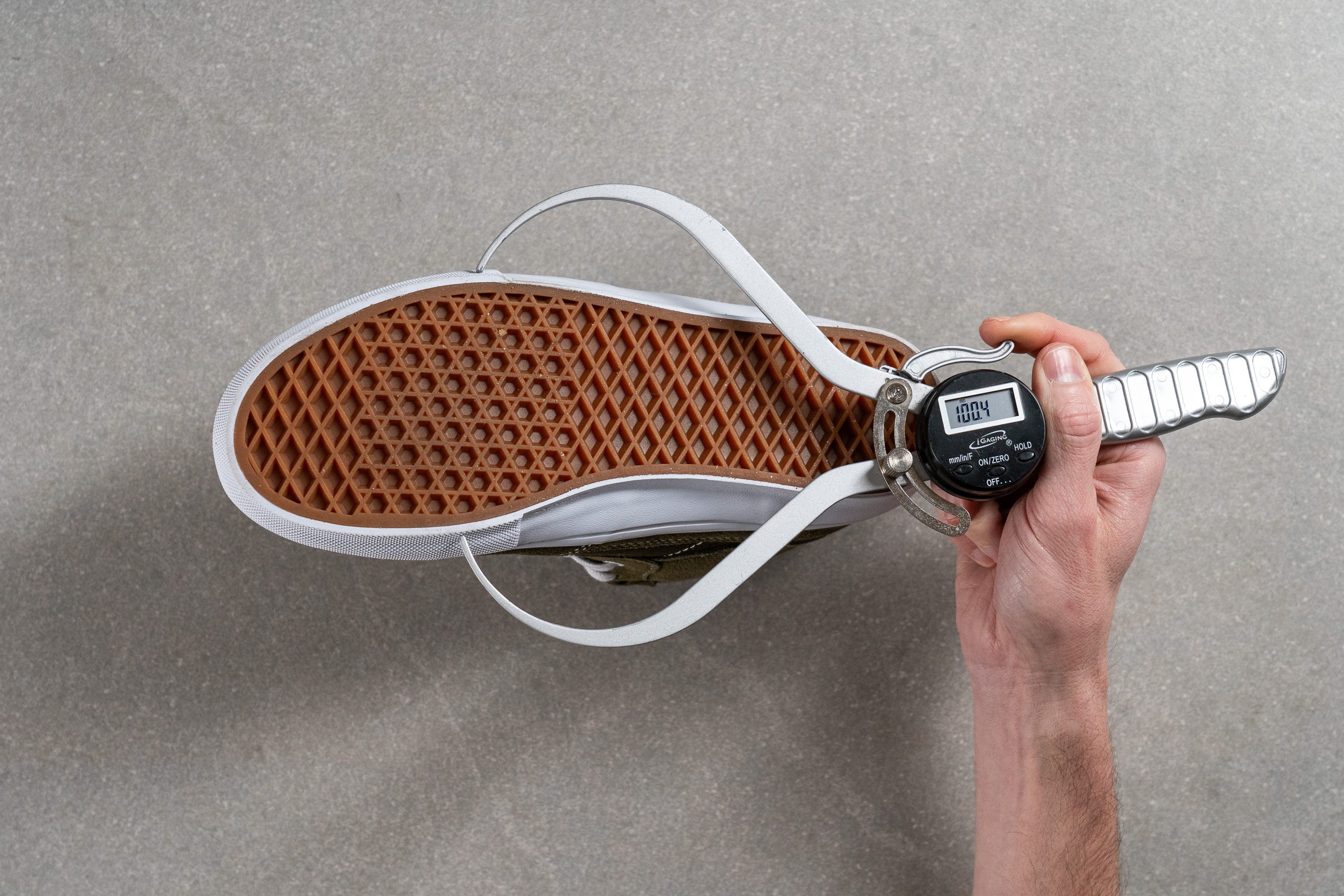
| Half Cab | 100.4 mm |
| Average | 108.9 mm |
Midsole width - heel
The discrepancy in the heel area was even more pronounced than the difference in the forefoot. The 69.4 mm width is way less than the average on record.
Though the much narrower footprint did not lead to slips, it did affect our confidence to make bold movements. Sneakerheads who are concerned with stability might be happier with the Vans Old Skool.
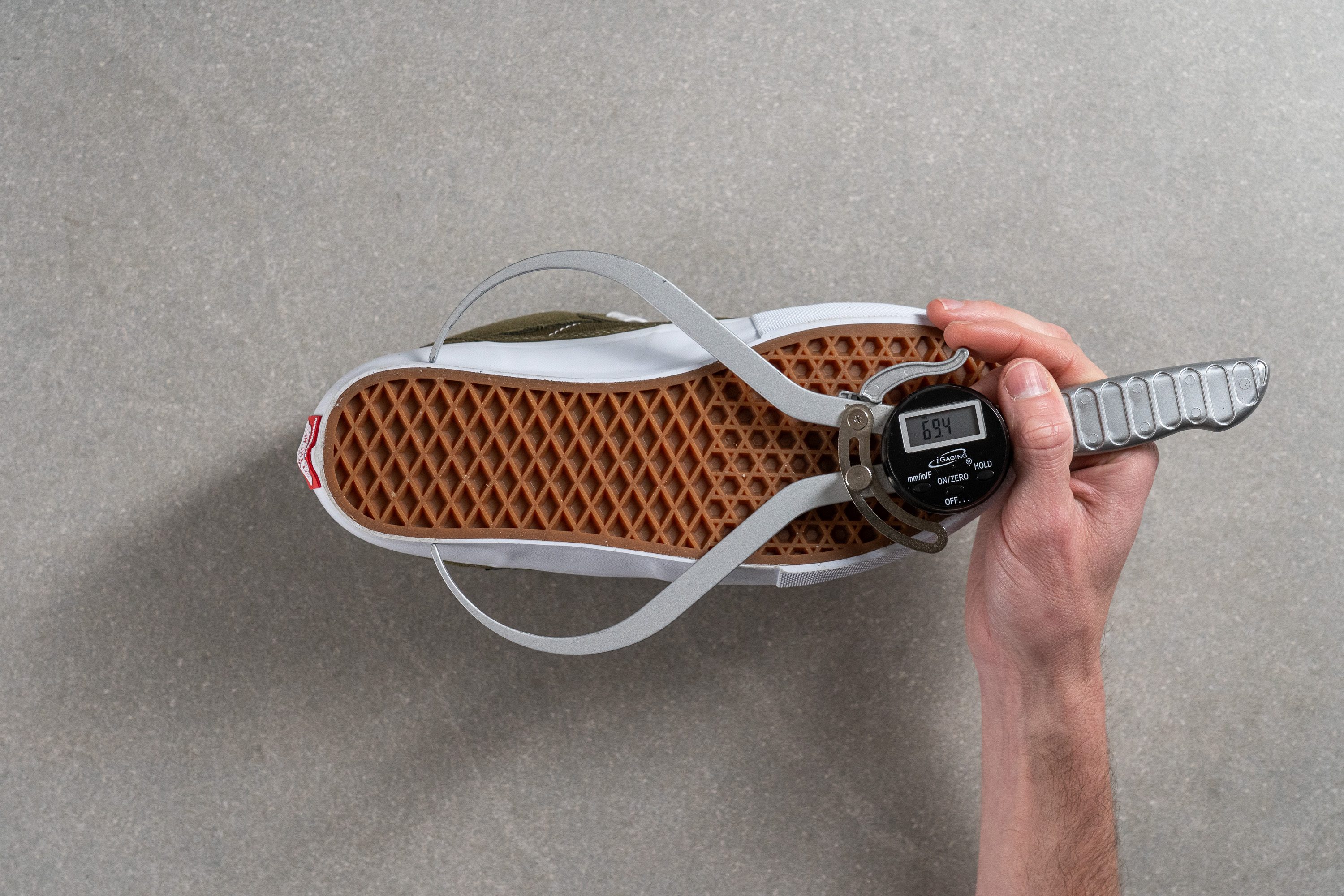
| Half Cab | 69.4 mm |
| Average | 84.0 mm |
Durability
Leather/Suede quality
To ascertain if the upper is made of suede as claimed, we did a fire test on the shoe. We then probed the burnt area using our awl. The results are convincing: the material was quite resistant to burning and it's safe to conclude that it was indeed suede. The smell of burning hair during the test was also unmistakable.
| Half Cab | Real suede |
Toebox durability
Being made of suede, we expected this shoe to be quite sturdy.
We were not disappointed. We accidentally and intentionally bumped this shoe or hard surfaces and it successfully weathered through all of them.
Our experience of durability was confirmed when we performed our standard Dremel test on the toebox of the Vans Half Cab. High-pressure drilling only made a faintly noticeable dent. It never got through the suede.
This sneaker was better than the New Balance 530, which ended up with a glaring hole after the same test. The Half Cab deserves a perfect 5 for toebox durability.
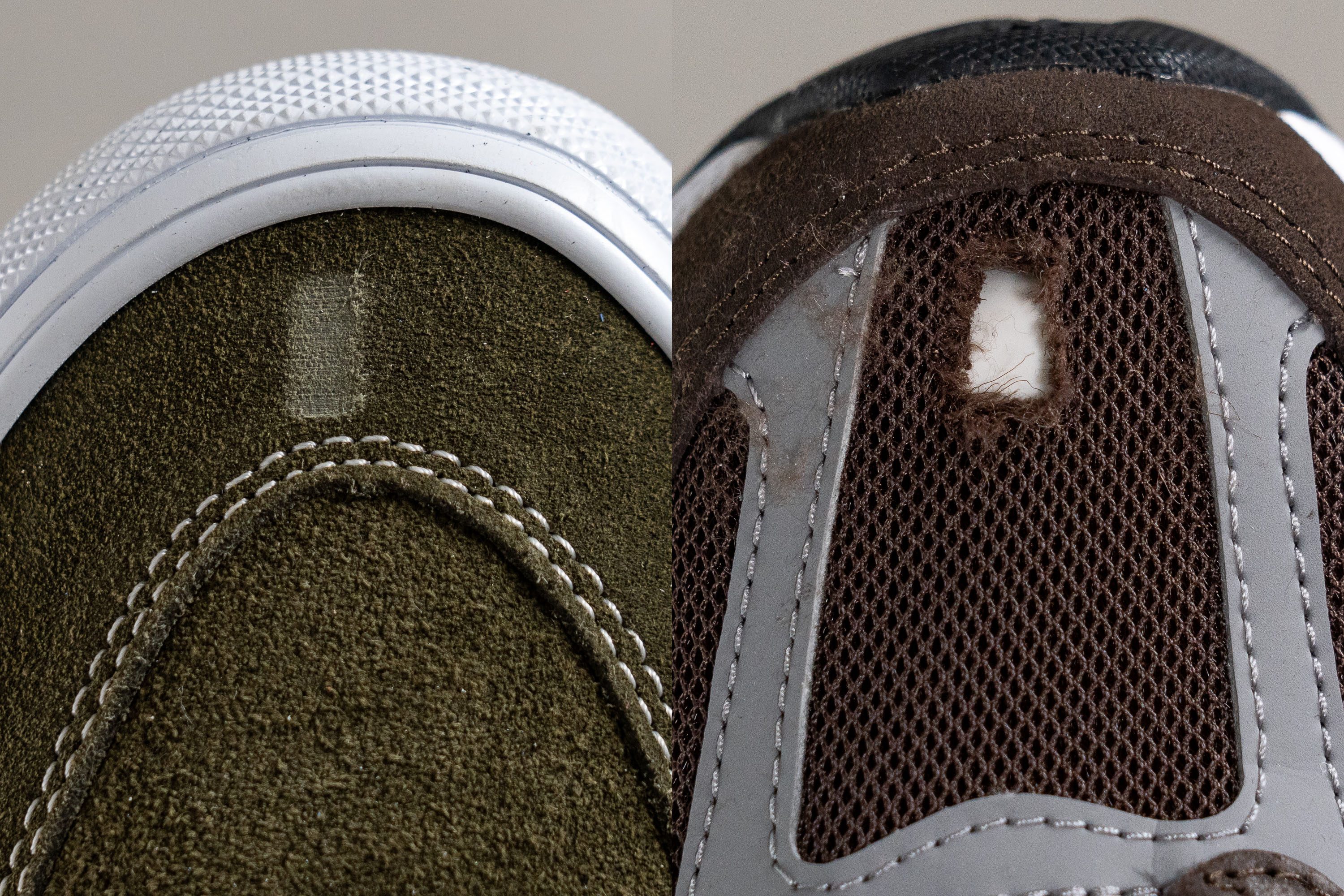
| Half Cab | 5 |
| Average | 3.7 |
Heel padding durability
Just like the toebox, the heel padding displayed commendable durability. It never looked dishevelled even when we were rubbing on it quite aggressively.
After our Dremel test on the heel padding, the damage that we observed was way less than the damage seen on the New Balance 237 (which only got a 1 out of 5, by the way). We gave the Half Cab a 4 out of 5.
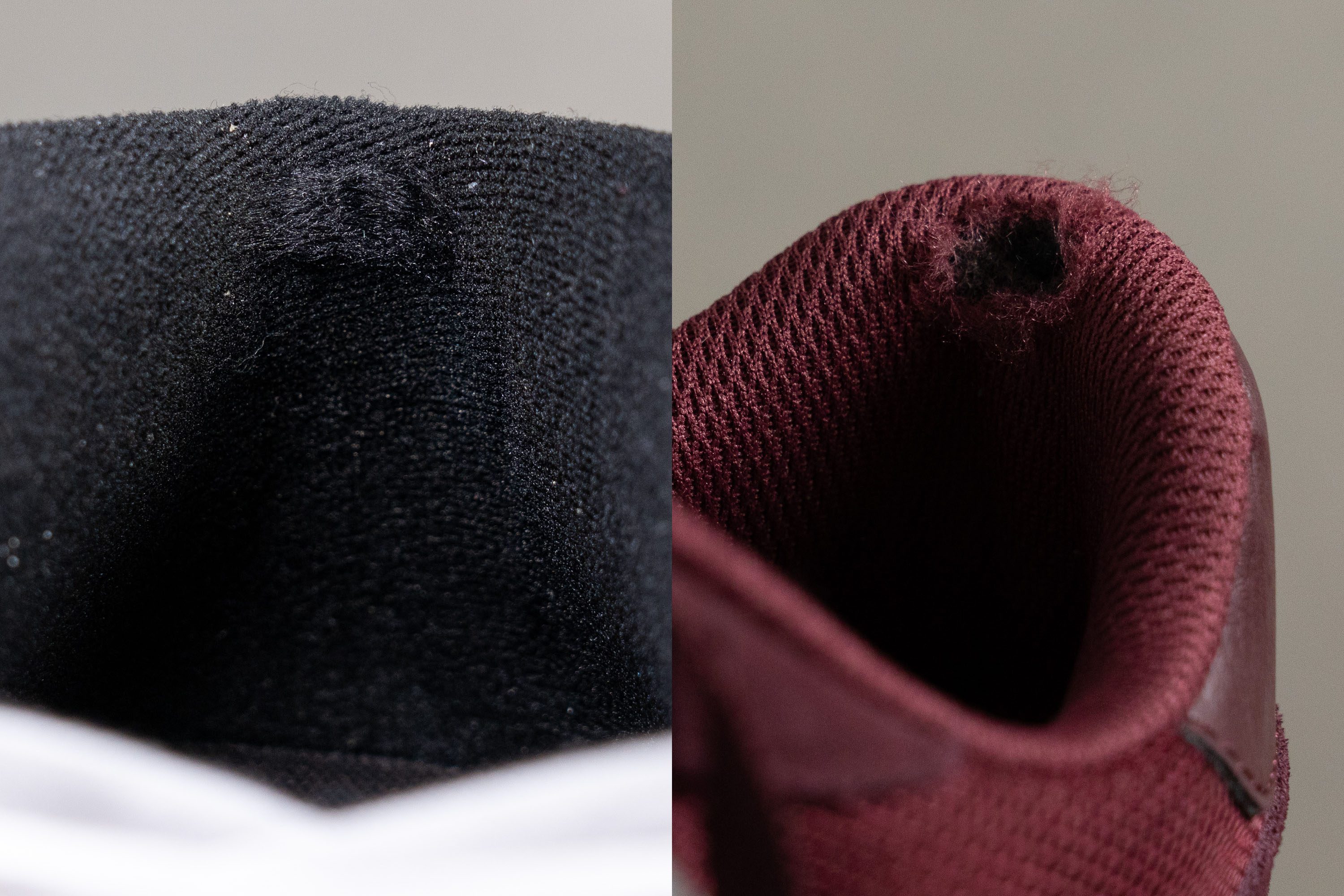
| Half Cab | 4 |
| Average | 3.2 |
Outsole hardness
When it came to the hardness of the outsole, we felt that the Vans Half Cab did not perform any better or any worse than many of the shoes that we wear-tested. With proper care, this shoe should be able to hold its own even when used on rough outdoor surfaces at times.
Our HC durometer in the lab gave it a rating of 82.5, a figure that is just around the average.
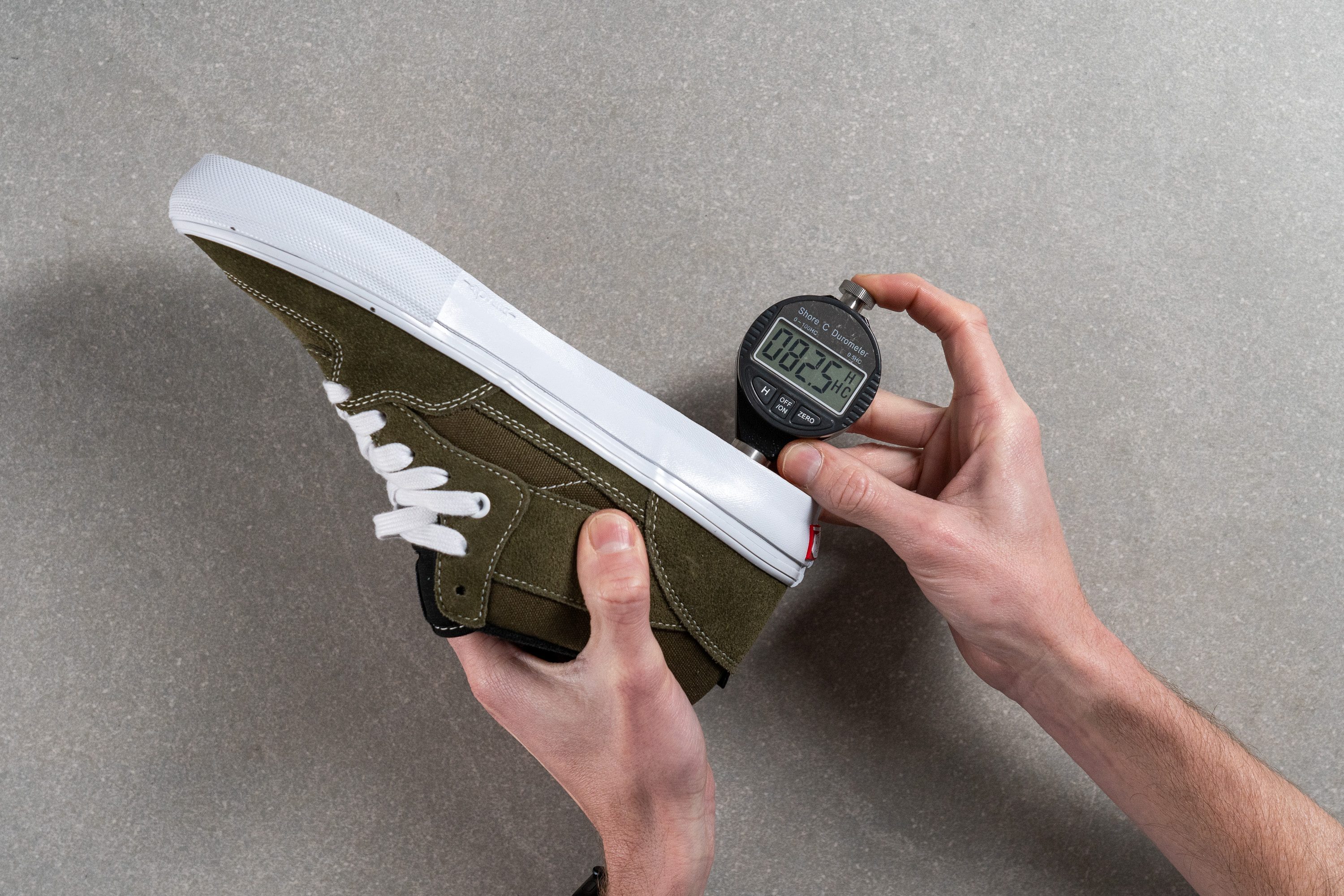
| Half Cab | 82.5 HC |
| Average | 85.7 HC |
Outsole durability
The hardness of the sole seemed indicative of its eventual durability.
We pressed the Dremel against the outsole, and the damage that we saw was 1.4 mm deep. This number is just around the average.
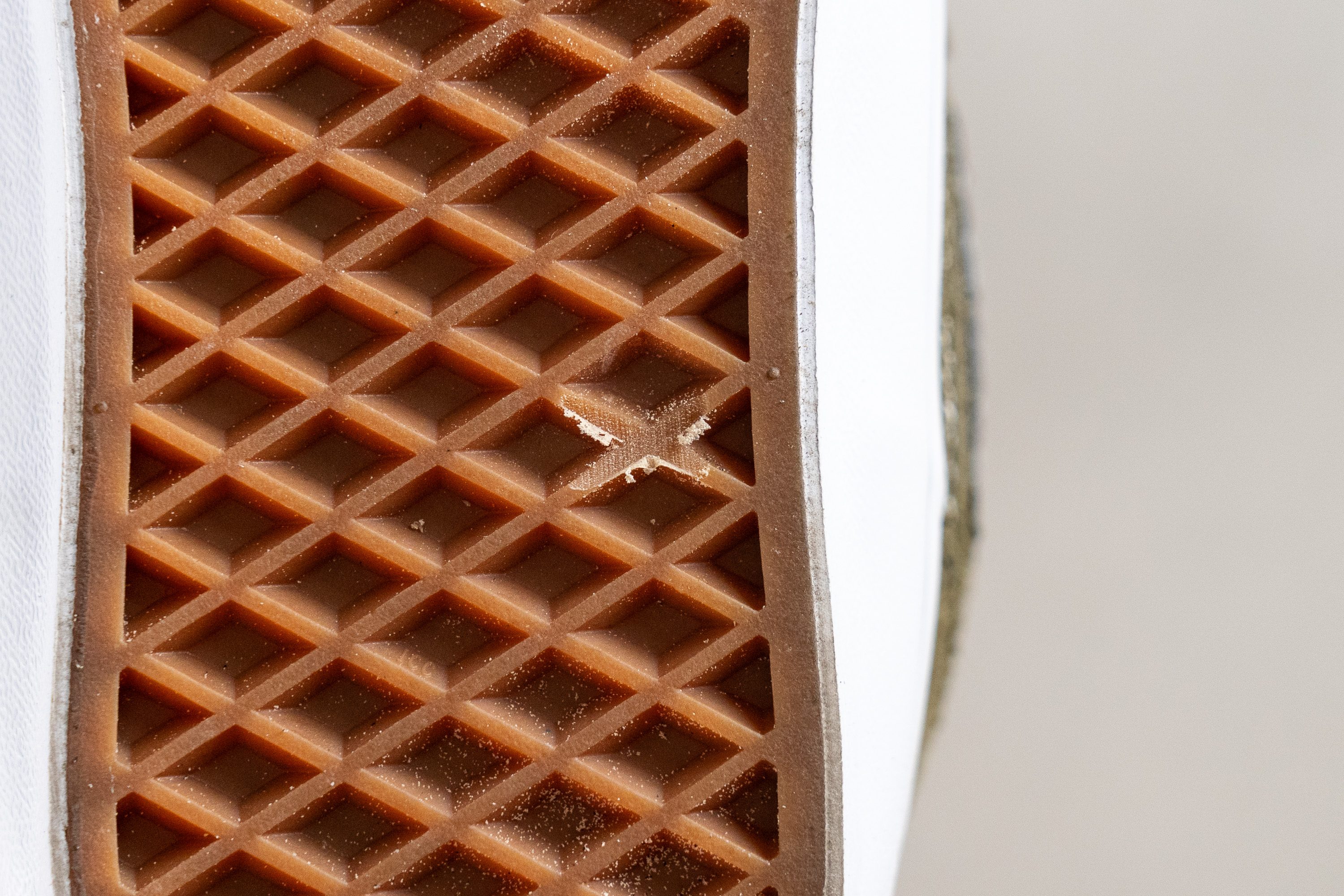
| Half Cab | 1.4 mm |
| Average | 1.1 mm |
Outsole thickness
The thickness of the outsole is just around the average, as well. Based on our calliper measurements, it is 6.1 mm thick.
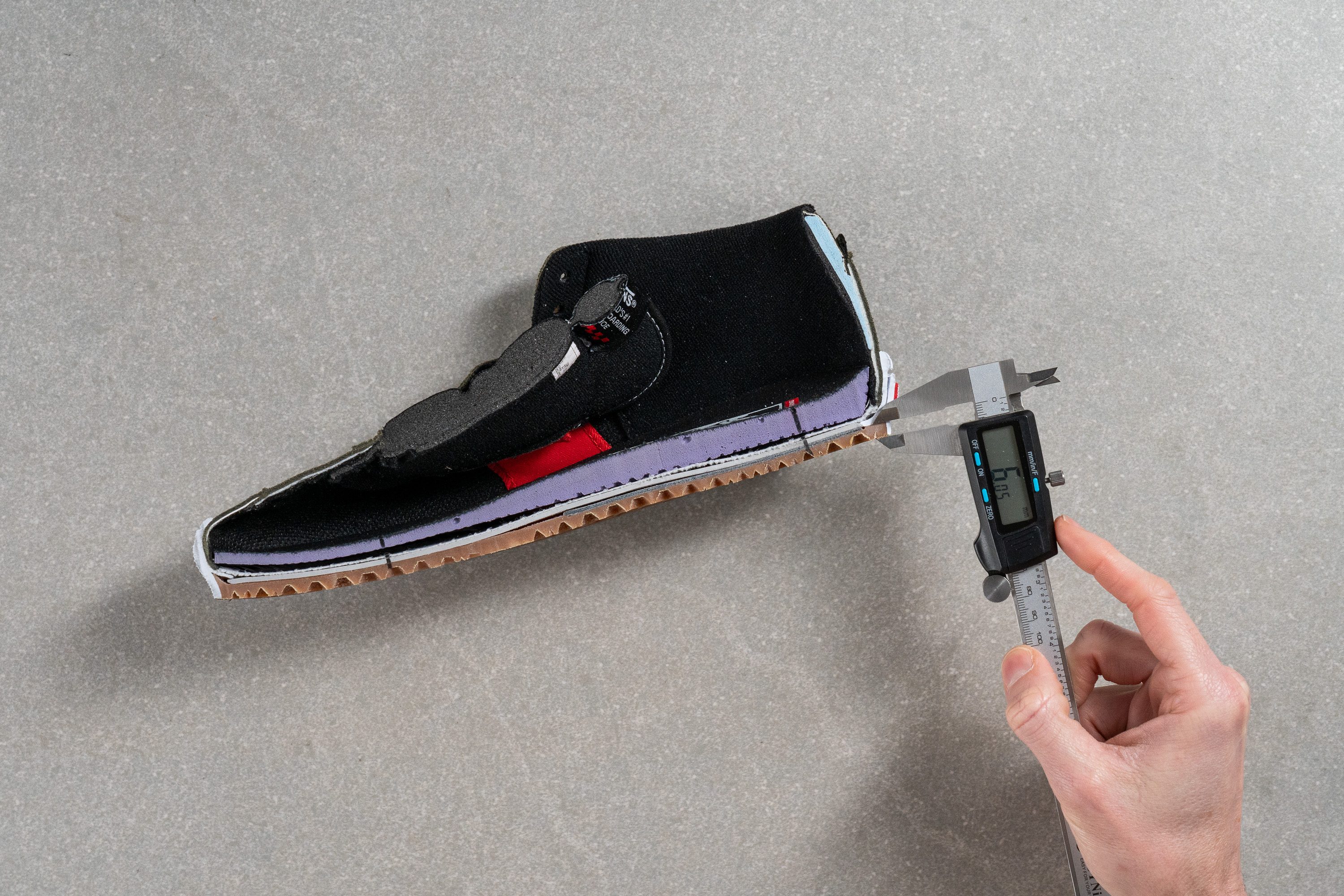
| Half Cab | 6.1 mm |
| Average | 5.3 mm |
Misc
Insole thickness
We found that the shoe's insole is more than twice as thick as the average at 11.5 mm. It is one of the thickest removable insoles we've ever seen!
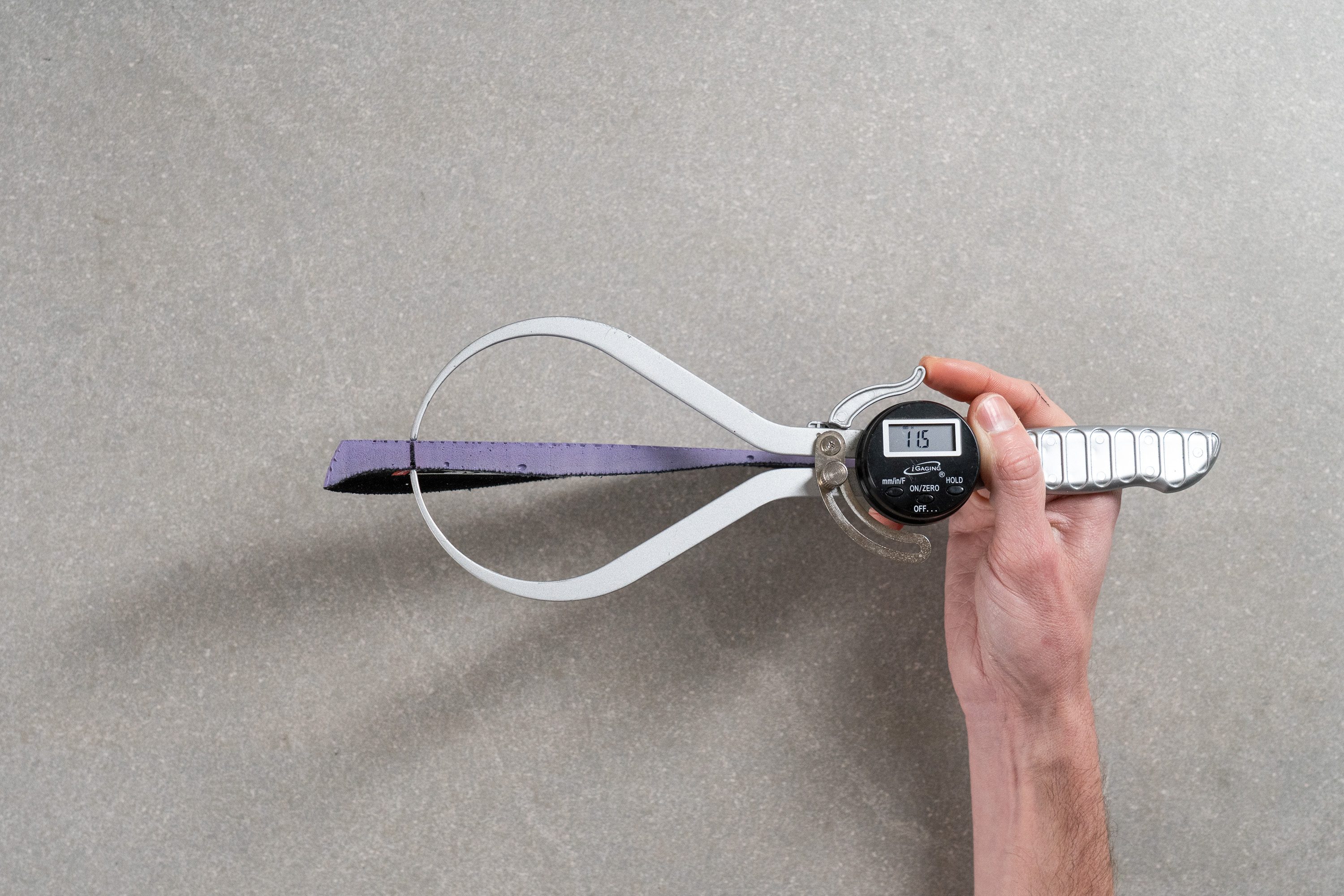
| Half Cab | 11.5 mm |
| Average | 5.1 mm |
Removable insole
The thick and comfortable insole that comes with the Vans Half Cab is removable.
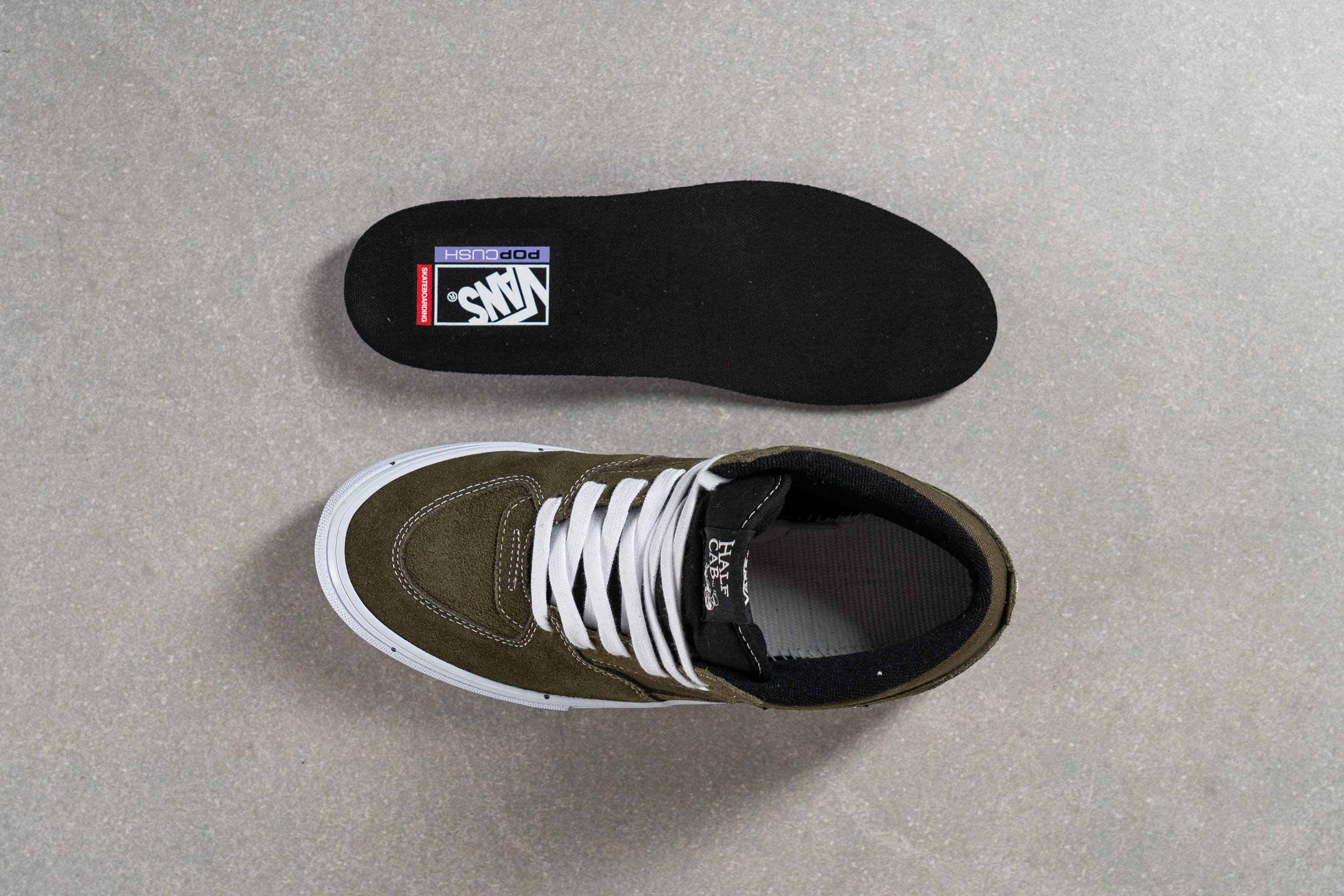
| Half Cab | Yes |
Reflective elements
The shoe does not have any reflective elements on it to enhance its nighttime visibility. It would be best to use this shoe in well-lit conditions.
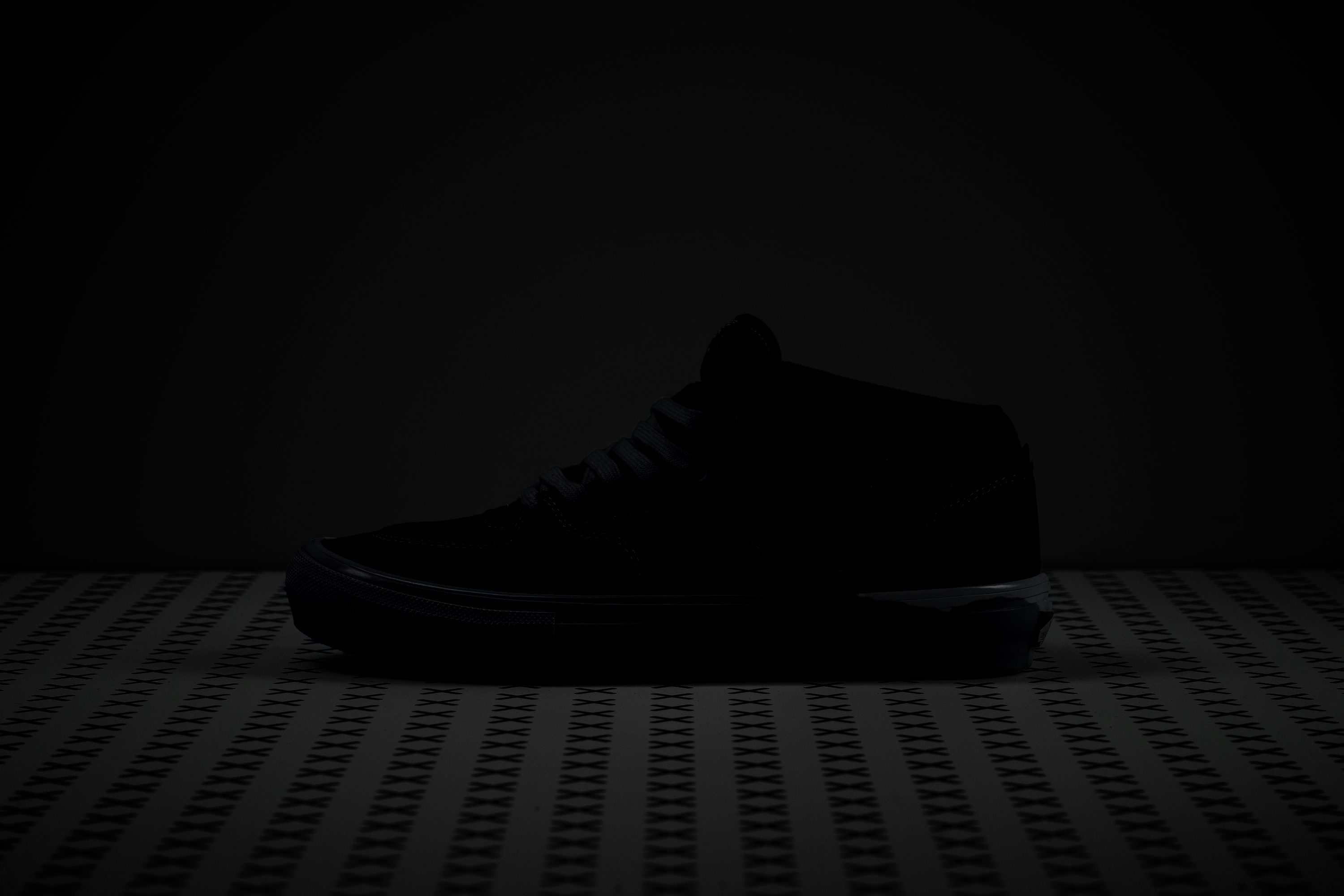
| Half Cab | No |
Tongue padding
When we say that the Vans Half Cab was big on tongue protection and comfort, we seriously mean BIG! The tongue is 20.4 mm thick, making it 129% thicker!
It felt nice on top of the foot, and it helped in improving the fit.
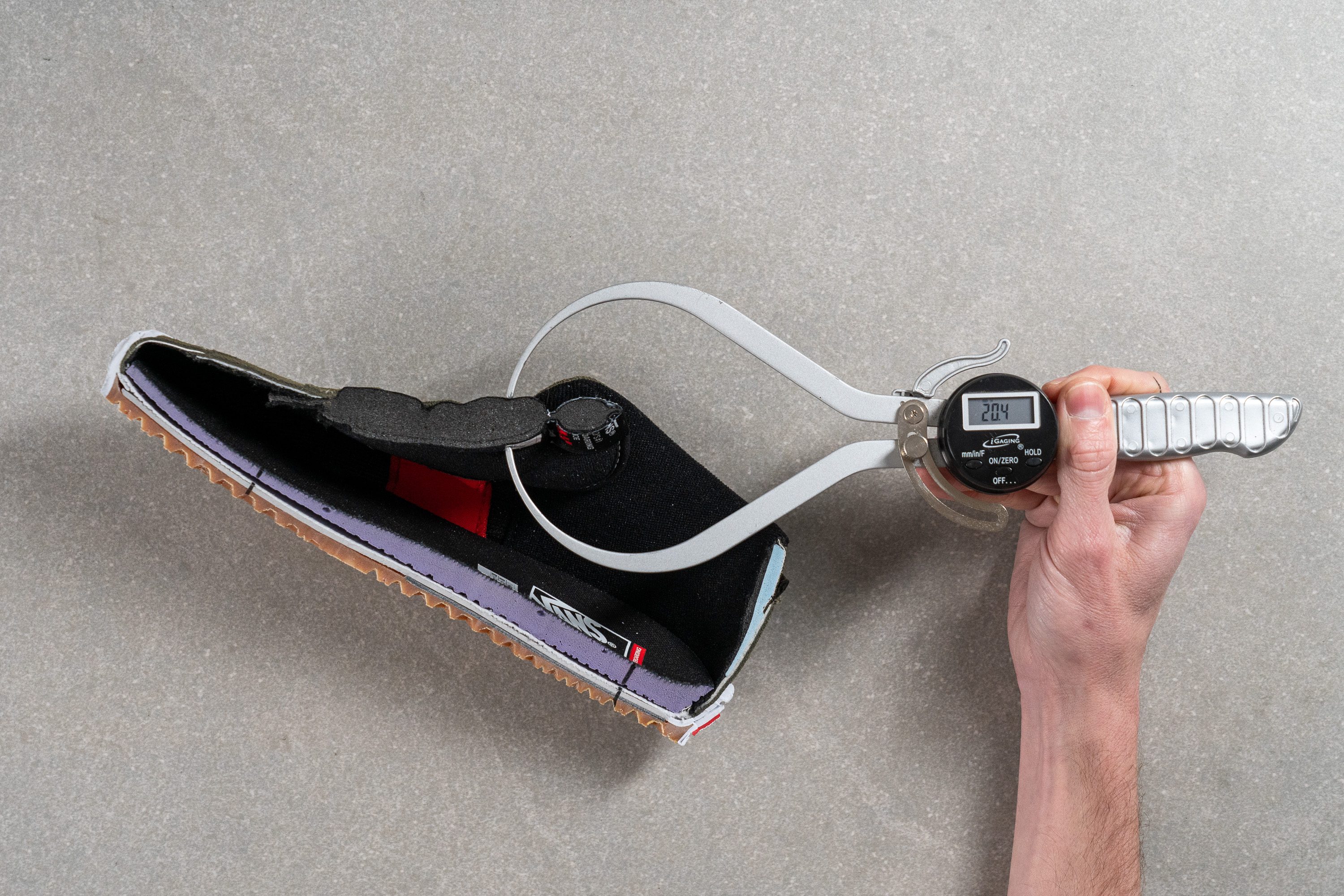
| Half Cab | 20.4 mm |
| Average | 9.6 mm |
Tongue: gusset type
Both sides of the tongue are semi-connected to the rest of the upper. This setup allowed the tongue to remain securely in place. It also provided leeway for flexibility and even breathability. In fact, a good part of the shoe's ventilation was through the tongue.
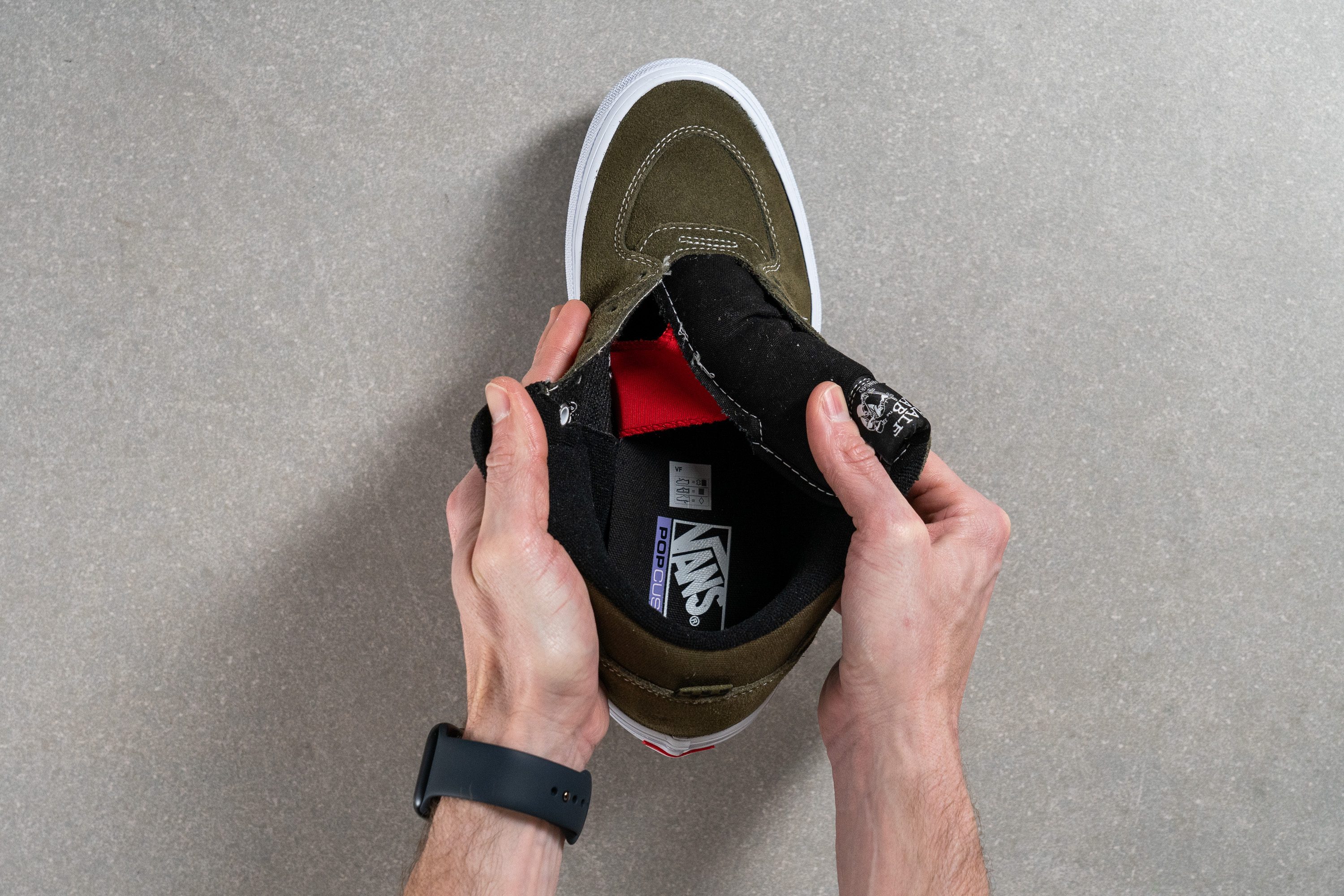
| Half Cab | Both sides (semi) |
Heel tab
This Vans sneaker does not have a heel tab, and it shouldn't be a problem because the on-off with this shoe was quite easy.
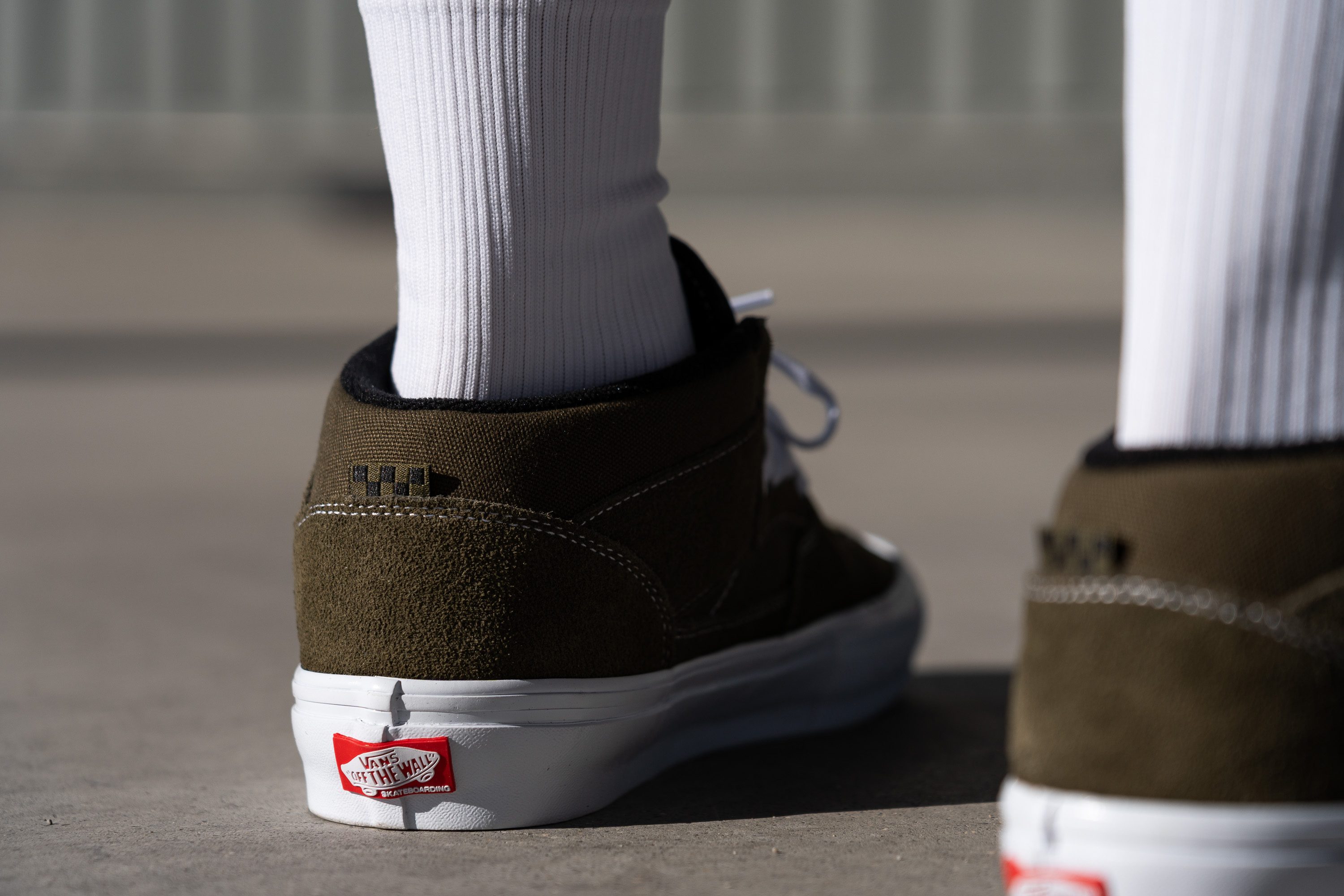
| Half Cab | None |

